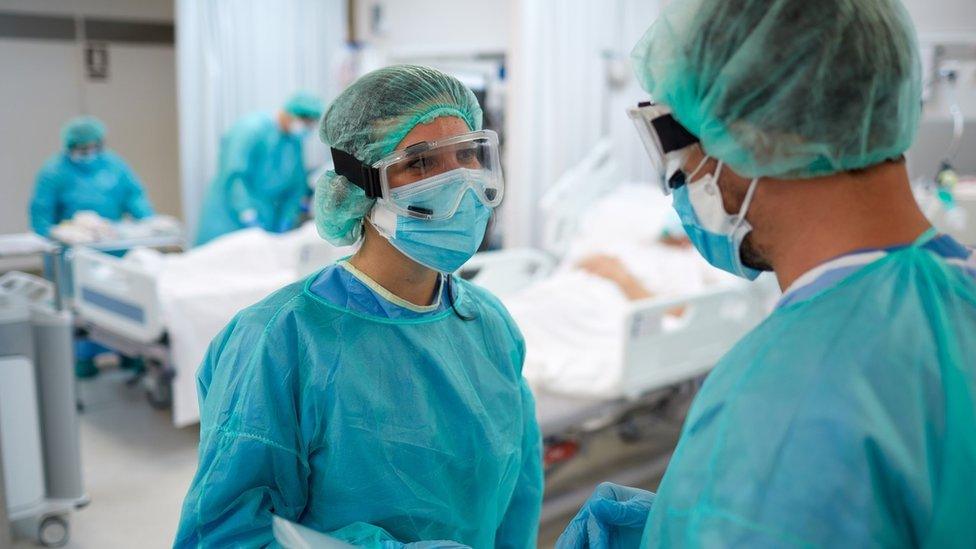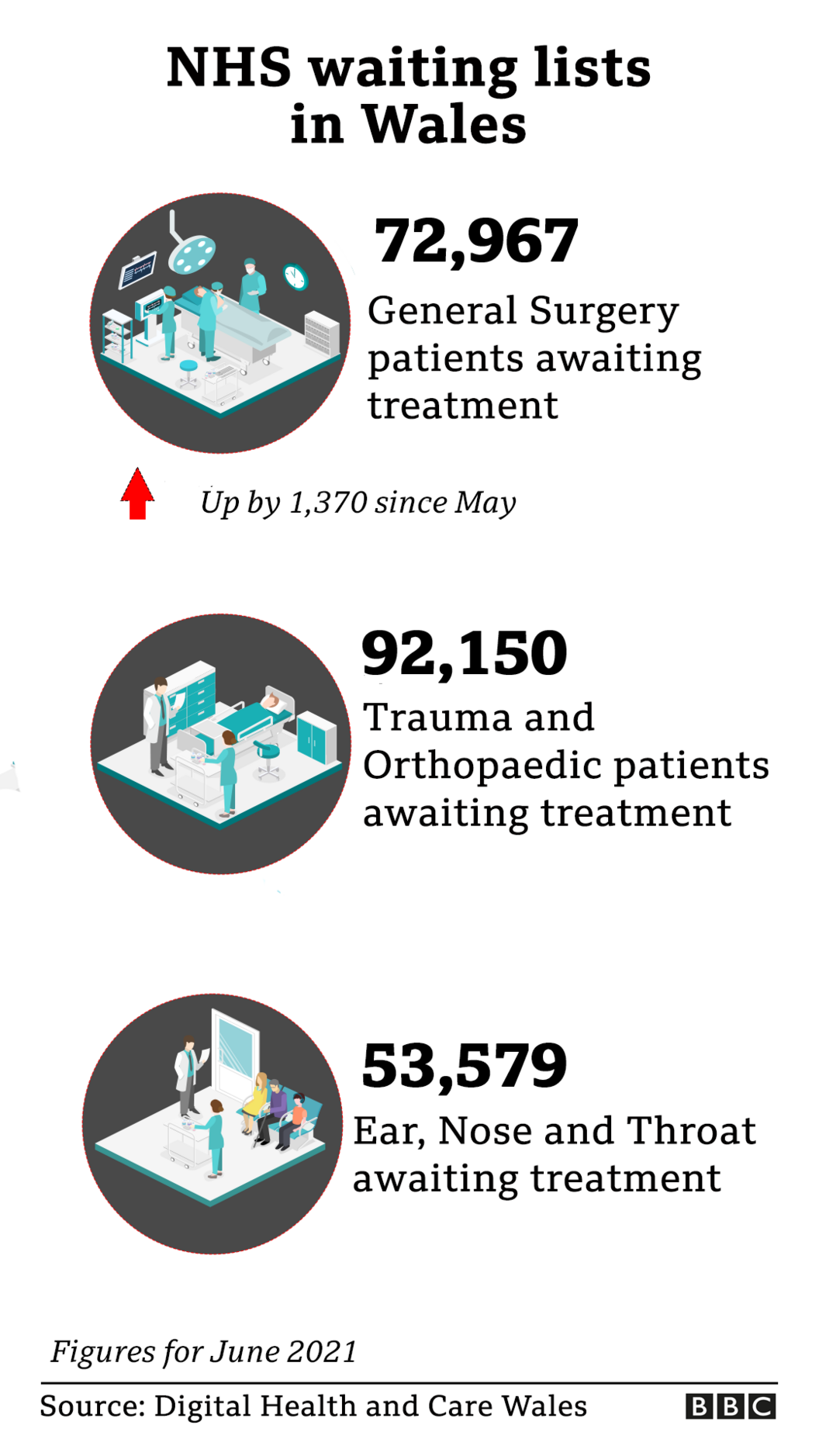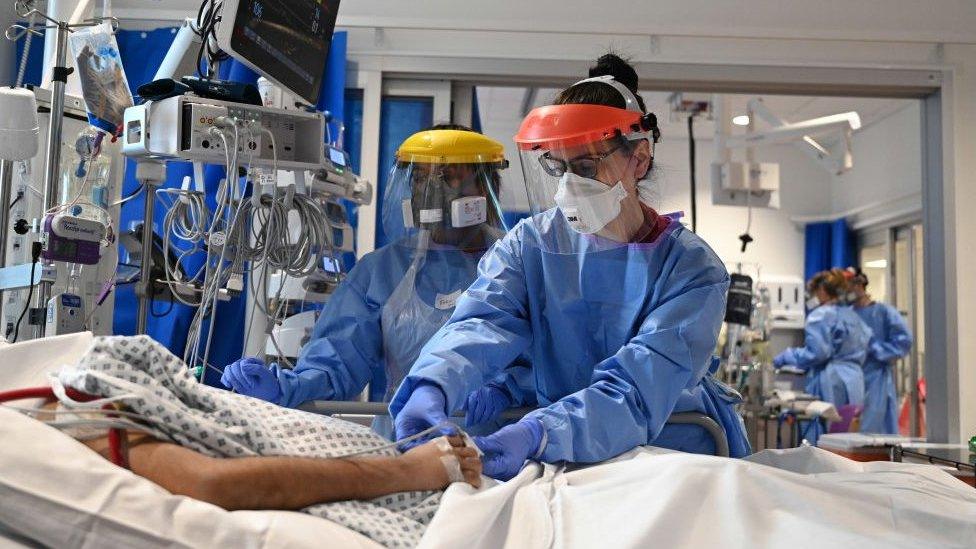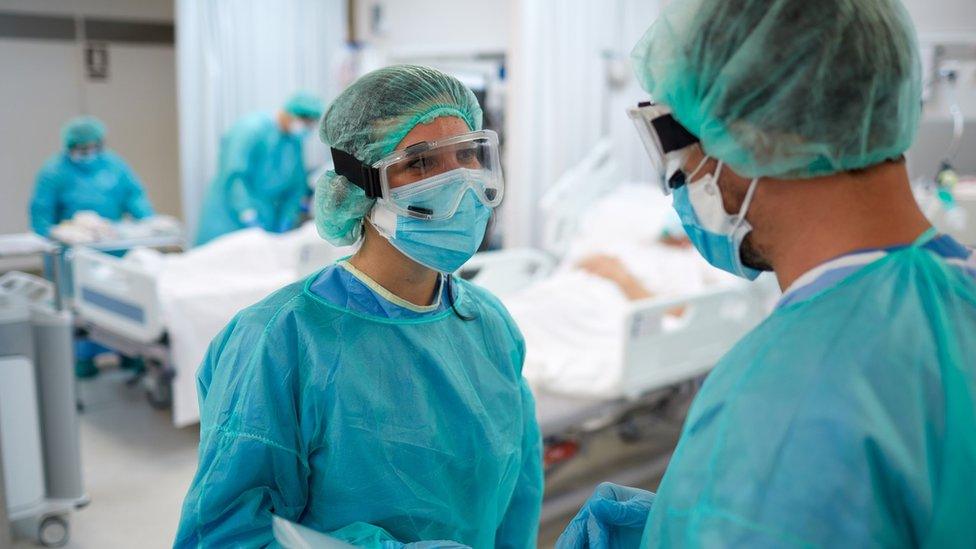NHS Wales: Waiting times hit record levels
- Published
- comments

The longest waits included 54,394 people due for orthopaedic or trauma treatment
The numbers on waiting lists for non-urgent hospital treatment in Wales have again hit record levels.
There were 624,909 people waiting in June, with the list climbing steadily each month and up by 41% since the early days of the Covid pandemic.
Those waiting the longest, more than nine months, rose again to 233,210.
A&E waiting time performance was the worst on record and Conservatives called the figures "catastrophic".
Emergency departments and the Welsh ambulance service both had their busiest months since the pandemic began.
A&E waiting times were the worst for a second month in a row - with only 69.8% of patients spending less than four hours waiting to be dealt with.

The headline figure for the number of patients waiting for non-urgent hospital treatment has been growing since the pandemic began, not helped by surgery being postponed during the first Covid wave.
There were another 17,869 people added to the list in the past month and numbers waiting more than nine months grew by 5,457.
A Welsh government spokesperson said: "Waiting times for treatment continue to grow.
"However, it is encouraging to see progress being made with the number of patients waiting over 52 weeks falling for the third month in a row.
"We also saw the largest number of specialist consultations completed and treatments started in any month since the start of the pandemic."


It comes as Wales' health minister pledged £551m to help health and social services recover from the pandemic.
Eluned Morgan said Covid had had a "massive impact" on the NHS and social services in Wales and was still facing significant costs in dealing with it.

The figures for June 2021 show:
The overall waiting list for treatment is a record 624,909
Numbers of patients waiting more than 36 weeks - nine months - to start treatment in hospital have grown from 25,634 in February 2020 to 233,210 (an increase of 810%)
The longest waits included 54,394 people due for orthopaedic or trauma treatment - a 546% increase since February 2020
Inroads have been made into those waiting for cardiothoracic surgery, but there were still 108 waiting more than nine months, more than twice the pre-pandemic number
Another 34,104 people have been waiting more than nine months for ophthalmology treatment - compared to 4,083 before the start of the pandemic
Numbers waiting for diagnostic tests were "markedly higher" than before the pandemic
Cancer patients who started their first definitive treatment within 62 days of it first being suspected was the second highest number on record although performance against the 62 day target fell slightly on the previous month.
The figures also show the Welsh Ambulance Trust received more calls in July than in any month since the pandemic began - with the highest proportion of "red" calls, those immediately life-threatening emergencies, on record.

There were also the highest attendances at A&E departments since the pandemic began and waiting time performance was the worst on record.
The target is that 95% of patients should be seen within four hours but that fell to 69.8% in July.
This dropped as low as 44.7% at Glan Clwyd Hospital in Denbighshire and 43.8% at the new Grange University Hospital in Torfaen.
The Grange, which opened in the middle of the pandemic last November, had nearly 8,000 people through the doors of its emergency department in July.
The monthly performance was the second-lowest ever for a Welsh A&E unit, after Wrexham Maelor Hospital in February last year.
Overall in Wales more than 7,000 patients waited more than 12 hours in A&E - one in 10 patients and another record high - with the target that no-one should wait that long.
Senior consultants said there was a "severely challenging situation," with "unrelenting pressure" on staff and fears the NHS would not be able to cope, with added winter pressures looming.
"Staff are already facing burnout, exhaustion, stress and moral injury," said Dr Suresh Pillai, vice president of the Royal College of Emergency Medicine Wales.
"The health service and its workforce need the assurance that there is a robust and comprehensive plan to manage this likely increase in demand and provide adequate resources for staff and departments."
'Catastrophic'
There were 94,176 attendances to emergency units over the month.
For the ambulance service, only 57.8% of more than 3,580 red calls arrived within eight minutes compared with the target of 65%. This was down from 60.6% in the previous month.
But more people started treatment for cancer in the latest month than in the previous month.
The total number of patients starting their first cancer treatment and the number of patients starting their treatment within the target time were the second highest since the current records began.
The Conservatives called the figures "catastrophic", saying Wales should be seeing improvements after it moved from the peak of the pandemic.
Health spokesman Russell George said: "To record the worst ever A&E waiting times and the longest NHS treatment waiting list in the same month shows a complete lack of leadership."
Plaid Cymru said the figures painted a bleak picture and called for a long-term plan.
"We cannot be trapped in an endless cycle where waiting times are getting increasingly worse and the only solution the government can come up with is to provide short-term fixes which change very little in the long run," said health spokesman Rhun ap Iorwerth.
Related topics
- Published19 August 2021

- Published22 July 2021

- Published18 February 2021

- Published17 June 2021
